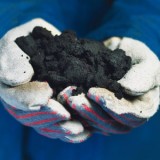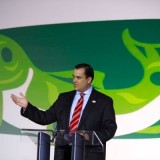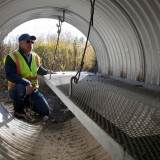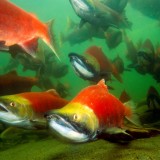And so it begins.The spin to jettison Enbridge’s proposed Northern Gateway Pipeline in favour supposedly “safer” alternatives.
This narrative will play out in two ways. The first was demonstrated by Conservative MP James Moore on CKNW’s Bill Good Show earlier this week (read the full interview here). After slagging Enbridge for its poor public engagement and safety record, the MP for Port Moody-Westwood-Port Coquitlam moved onto what he presented as the superior alternative.
And I think, you asked the question, who else is there out there? I think if you look at the Kinder Morgan pipeline and the way in which they are very judiciously and responsibly engaging with British Columbia’s First Nations, the way in which they’re taking environmental challenges seriously, they way in which they’ve operated for 60 years without any spill—there’s one on land that had nothing to do with Kinder Morgan, but had to do with contractors who were tearing up the streets in Burnaby. There’s a difference, I think, night and day between a company that gets public engagement, Aboriginal engagement, environmental stewardship and Enbridge, which I think their track record is not one that I think any other company should follow if they want to do business in BC.
Bear a few things in mind when you read these extraordinary statements by Mr. Moore. First, Moore, the Federal Heritage Minister, is a rising young star in the Consetvative Party – particularly in BC.
Second, nobody but nobody in Stephen Harper’s button-down caucus opens his mouth – especially about something so key to the Prime Minister’s agenda, not to mention such a hot button issue – without having first received explicit directions to do so from the very highest echelon. What this clearly means is that Moore has been tapped to do Harper’s Enbridge damage control in BC – and the choice of the Bill Good Show to debut this new framing was as calculated as a Catholic Sunday Mass.
The second alternative to the Northern Gateway Pipeline to Kitimat is one that will only work if Enbridge’s reputation is deemed salvageable – and let’s face it, at a spill a week, that’s looking increasingly doubtful. Neverheless, there may well yet be a move to reroute the Kitimat line to Prince Rupert, dumping the perilous planned port at the end of Douglas Channel in favour of a safer harbour just up the coast.
In many ways, Rupert is the more sensible choice, although the pipeline route itself is potentially riskier in this case, transiting several hundred km down the Skeena Valley – a vital salmon artery, rife with geological instability. It is for this reason the Prince Rupert option lost out to Kitimat back in 2005 when both were still on the table.
No matter the comparative safety of the Port of Prince Rupert, many other concerns about the pipeline, the Tar Sands it would carry and whose expansion it would facilitate, and the dangers of a spill in BC’s rugged coastal waters – particularly in Dixon Entrance and Hecate Strait, which the tankers from Prince Rupert would still transit – remain unchanged in this scenario.
Moreover, Enbridge’s credibility remains a major obstacle no matter what. The choice could be made to switch to a different pipeline company altogether, such as TransCanada or Kinder Morgan (the company from whom Kinder bought the Trans Mountain Pipeline, Terasen, had a rival bid to build a pipeline to Rupert in the early 2000s)…but I wouldn’t bet on the Prince Rupert option, for all of the above reasons.
Rather, as James Moore predictably indicated, the twinned Kinder Morgan Trans Mountain Pipeline to Vancouver would seem to be the alternative the powers that be will most likely glom onto to salvage their dreams of expanding the Alberta Tar Sands and accessing new Asian markets.
It is for that reason Mr. Moore needs a refresher on Kinder Morgan, the Texas-based energy giant that has indicated it wants to boost its bitumen pipeline capacity through BC from 300,000 barrels a day to 850,000, meaning a five-fold increase in tanker traffic through Burrard Inlet, the Gulf Islands and Strait of Juan de Fuca.
Moore was wrong on everything he told Bill Good about Kinder Morgan’s track record.
First, to his claim of good aboriginal engagement on the part of the company, just ask the Tsleil-Waututh First Nation, in whose territory the pipeline terminus lies and the tankers would transit. They came out last month, along with their neighbours the Squamish First Nation, to sign the “Save the Fraser Declaration”, joining over 60 BC First nations who’ve already declared their opposition to oil pipelines and tankers through BC.
The Musqueam First Nation of Vancouver, who also have a big say in the company’s plans, had already signed onto the declaration.
The Tsleil-Waututh have voiced their concern about the lack of consultation they’ve recieved on this matter from the BC Liberal Government and stated in April after the company made its plans official, “We want to make it crystal clear that we will oppose any and all increased oil tanker traffic in the Inlet and we oppose the notion of Kinder Morgan turning Vancouver into an oil port city.”
To Moore’s point that Kinder Morgan wasn’t to blame for the rupturing of its line in Burnaby in 2007, he must not be aware that the company plead guilty in 2011 in provincial court for the spill. The court heard that the pipeline’s owner should have done a better job of monitoring work near the line that tore into it, as this Global TV report shows.
Moore must also be ignorant of or deliberately ignoring the leak of 110,000 litres of oil the company suffered at its Abbostsford tank farm earlier this year.
Moreover, with drastically increased bitumen flow and tanker traffic – up to nearly 400 a year from the company’s port in Burnaby, if it gets its way – comes vastly increased risk; or, as my colleague Rafe Mair and many others remind us, certain calamities. And with such a disaster in the waters of Vancouver or the Salish Sea come enormous consequences, both environmental and economic, as Rex Weyler has illustrated in these pages.
Kinder Morgan may not have faced the same scale of public opposition to its plans as Enbridge has seen – but that’s only because it just made its plans official a few months ago. Campaigns are already developing to target the Texas company (full disclosure: I’m part of one of them) and with the likes of Moore shaping this new narrative – dumping Enbridge for a supposedly “safer” Trans Mountain option to Vancouver – the spotlight will increasingly be on Kinder Morgan.
Either Mr. Moore is deliberately deceiving the public about Kinder Morgan’s track record or he’s simply ignorant of it – and being from Vancouver, frankly, he should know better.





